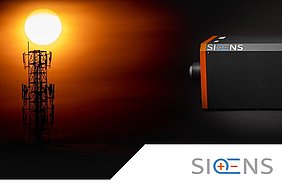
A resilient and fail-proof communications network is critical in restoring the power grid after a major disruption or blackout. Particularly in view of the current geopolitical situation, this topic is more urgent than ever. The phase-out of coal-fired power generation, for instance, eliminates important cornerstones of grid restoration concepts, while grid operation is becoming progressively decentralized as a result of the build-out of renewables, thereby demanding an increasing exchange of process data.
TSOs' catalog of measures underlines urgency of protecting critical communication
As a response, the four transmission system operators submitted an updated catalogue of measures, based on the “Network Emergency and Restoration Code” (EU 2017/2196) in October 2022. The measures aim at extending the availability of blackout-proof communication between relevant actors alongside the power grid to 72 hours.
Among other things, this is aimed at making voice communication between control centers, data exchange for monitoring and controlling the power grid, and the necessary switching operations in the transmission and distribution grid blackout-proof. Since a self-sufficient energy supply via batteries can typically only be maintained for a limited period of time, noisy and carbon-intensive diesel generators are currently used in most installations.
Fuel cells present a technological alternative to diesel generators
However, there is growing pressure to significantly reduce emissions in the medium term. In this connection, fuel cells are on track to replace diesel generators in the area of backup power supply. This has practical reasons as well, because diesel cannot be stored indefinitely. Back in 2015, the German Federal Office for Information Security made clear statements on this subject in an analysis of backup power systems:
In almost 60 percent of the examined systems, the stored fuel was unusable. That is due to the fact that, according to the Biofuel Act, DIN 590 diesel is refined with seven percent fatty acid methyl ester and is designed for consumption within 90 days. In plain language, this means that the fuel is not stable over the long term and – in many cases – can therefore no longer power the respective generators.
SIQENS offers field-proven fuel cell modules for critical infrastructure
Fuel cells like the SIQENS Ecoport use methanol, whose high hydrogen content is used to generate electric power. Methanol is stable over prolonged periods and can be used without problems even after many months of storage - ensuring that power is generated when needed. Depending on the configuration, a module can deliver up to 1,500 watts. Higher outputs in the range of several kilowatts can be achieved through parallel connection.
Demand for fuel cells is growing strongly, particularly in the area of critical communications. At the beginning of 2022, the Munich-based company won a major contract to supply fuel cell modules for the backup power supply of critical infrastructure to a renowned provider of telecommunications and security services. Further systems for reliable power generation are currently in the process of implementation.
About SIQENS:
SIQENS, founded 2012 in Munich, is a leading provider of methanol fuel cells and technology for electrochemical hydrogen separation (EHS). The Company’s methanol fuel cell product line (Ecoport) supplies clean energy in remote areas or backup power to critical applications. Built on its patented high-temperature polymer electrolyte membrane (HT-PEM) technology portfolio for power generation, SIQENS offers solutions to separate and purify hydrogen at the point of use from several feed gases – as from hydrogen-blends in natural gas pipelines or reformate gases from methanol or biogas. The SIQENS technology portfolio addresses the challenge of last-mile hydrogen distribution: Driving the decarbonization of power generation, transportation, and industry by reducing the cost of hydrogen delivery.
Pressekontakt:
SIQENS GmbH
Leon Schwarzott
Landsberger Str. 318 D
80687 Munich
+49 89 452 44 63 0